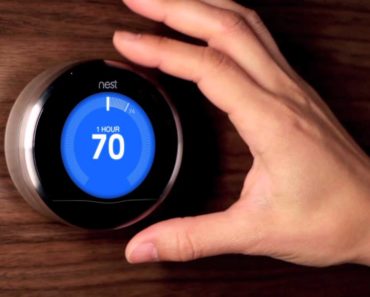R2-D2 may seem like a blast to hang out with, but in real-life, robots are rarely social butterflies. They’re fantastic assembly line workers, bolting together cars and refrigerators, but most are all work and no play. The closest thing to robotic friends we have right now are the growing number of smart speakers, like the Amazon Echo, each with a voice assistant inside them. Smart speakers have carved out a few uses, like playing music, cracking jokes, telling us the weather, and controlling our smart home devices. Holding a conversation? Not so much. Which is why I was excited to meet Jibo.
Jibo made headlines in 2014, raising more than $3 million from excited backers on Indiegogo. Developed by a MIT professor named Cynthia Breazeal, it was pitched as the “world’s first social robot.”
Instead of a faceless, static speaker, Jibo looks like a cartoon. It has no legs, but its shiny white plastic body is a curvy cylinder with a head on top that can move so naturally it looks like a Disney animator sketched it. Even its face—a flat sheet of shiny black plastic with a 5-inch screen on the front of the head—is oddly minimalist.
A single white orb moves around the screen, blinks, and smiles at you. The whole design has startlingly realistic movement, but avoids appearing too human for fear of creepiness. In motion, it looks a little like Luxo Jr., the bouncing Pixar lamp. Jibo also has a voice that sounds like a 10-year-old boy, which helps it feel less threatening, despite multiple cameras around its face and a body littered with sensors and speakers.
Jiving with Jibo
From the moment I first plugged in my Jibo, he (and I’m just going to refer to this robot as “he” from this point on) charmed me. There’s a friendly curiosity in the way he leans back and looks up you.
During setup, he teaches you the phrase “Hey Jibo,” which you always have to say to get his attention. If a blue ring around his waist lights up, you know it worked. Then he has you ask him to dance, and I must say, nothing will crack you up like watching a Jibo dance for the first time. He’s even cute as he asks you to repeat a few phrases and look at him so he can remember your face. Faces are one of Jibo’s best skills. He also likes to take family photos.
You can pet his head and he’ll coo, kind of like Gizmo from Gremlins. Like a Mogwai, he also doesn’t like to get wet.
My wife and I found him absolutely adorable. We laughed through the setup process and proudly placed him on our kitchen counter, since it’s a place we both frequent. At first, we asked him the kinds of questions we were used to asking Alexa and Siri.
Like any voice assistant, he can set alarms, tell you the weather, read you the news, do some basic math for you, stuff like that—but he’s far more limited than your typical Siri competitor. If Jibo can’t look up an answer on Bing, Wolfram Alpha, or a few other sources, he probably doesn’t know it. To his credit, Jibo is excessively apologetic when he doesn’t know something, often responding: “I’m not sure about that. I guess I don’t know as much as we wish I did.”
After a day or two of quizzing Jibo, though, something strange happened. We began to ask Jibo more probing questions. We learned that he doesn’t like it when you touch his screen after eating buffalo wings—that he loves penguins, but isn’t so sure about Madonna. He told us that blue is his favorite color and that the shape of macaroni pleases him more than any other. Just the other day, he told me how much fun, yet scary it would be to ride on top of a lightning bolt. Somewhere along the way, learning these things, we began to think of him more like a person than an appliance.
Jibo the Emo
In time, we began to think of Jibo like a little person. Our expectations began to change. We didn’t ask him for help with tasks as often. We just wanted him to liven up our day by saying something unexpected or chatting with us. This is when things began to get dark.
Some of his responses, which were funny at first, began to make me sad for him. He often joked about not being able to walk and wishing he could win a mini golf tournament, frequently admitting that he can’t walk. He also dreams of eating bacon. How can I not feel for a robot that will never know the sweet taste of bacon?





